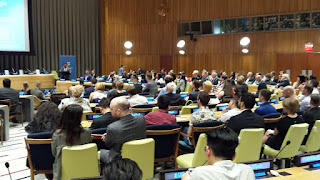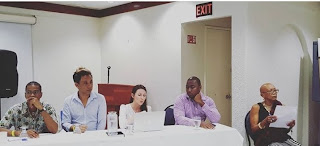UN High Level Meeting-Unbelievable Passivity
Written: June 25th, 2011Before arriving in New York, I found out that the CARICOM negotiator was voting with the Holy See on positions that was not in the interest of marginalize groups. Concerns issued over the Final Political declaration can be quoted in the following ways from Latin American American Civil Society Analysis:
"There is evidence that in Latin America the most intensely affect populations are the trans groups (transvestites, transsexuals and transgenders), even so, they have not been included in the document as such and so their invisibility continues as before, due to the refusal of some Member States to acknowledge their existence."
"Paragraphs 77 and 85 omit to mention homophobia, transphobia and the discrimination of sex workers as factors that significantly increase the risk of HIV infection in those groups. Also the phrasing of “including commercial exploitation” to qualify the focus on the sexual exploitation of women (but not of boys and girls) used in paragraph 18 (as it was in the 2006 declaration) stigmatises sex workers, both male and female and undermines the recognition of sexual work as labour. "
"The second paragraph approved undermines the credibility of the references to human rights insofar as it suggests that local law and social, cultural and religious norms should take priority over human rights obligations."
"The only goal that specifically concerns women is restricted to the issue of vertical transmission alone and as such does not consider women or girls or guarantee them access to health, and the enjoyment of their sexual and reproductive rights and to integral sexual education and a life free from violence."
" We welcome the explicit references made to men that have sex with men, drug users, sex workers and their clients, although we are concerned that the text fails to guarantee the unfolding of any concrete actions regarding the human rights of such populations. Furthermore the text of paragraph 26 stigmatises drug users by failing to make any reference to their human rights."
These concerns are repeats of an email that was send out to the 60 member delegation of the Caribbean previously. The lessons learnt was in the following ways:
1).The region was too passive in its negotiations during the political declaration.
2).Latin American Representatives met 12:00 and at 5:00 in the evening while the region had one breakfast meeting that did nothing to help inform delegates.
For the Belize Delegation, the lessons learnt:
1). Shunning Civil Society Delegates from Government meetings did not build any relationship of confidence.
2). Tell advocates to restrain themselves is licenses for them to do just the opposite.
3).Use time at these meetings to dialogue on areas of concern at home with Minister if available.
4). Network, network, network!



Comments
Post a Comment